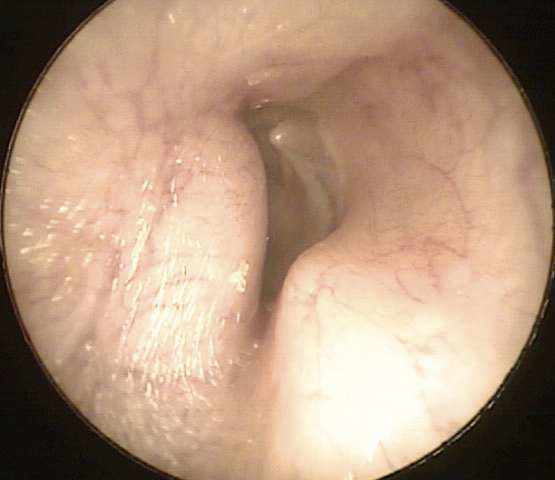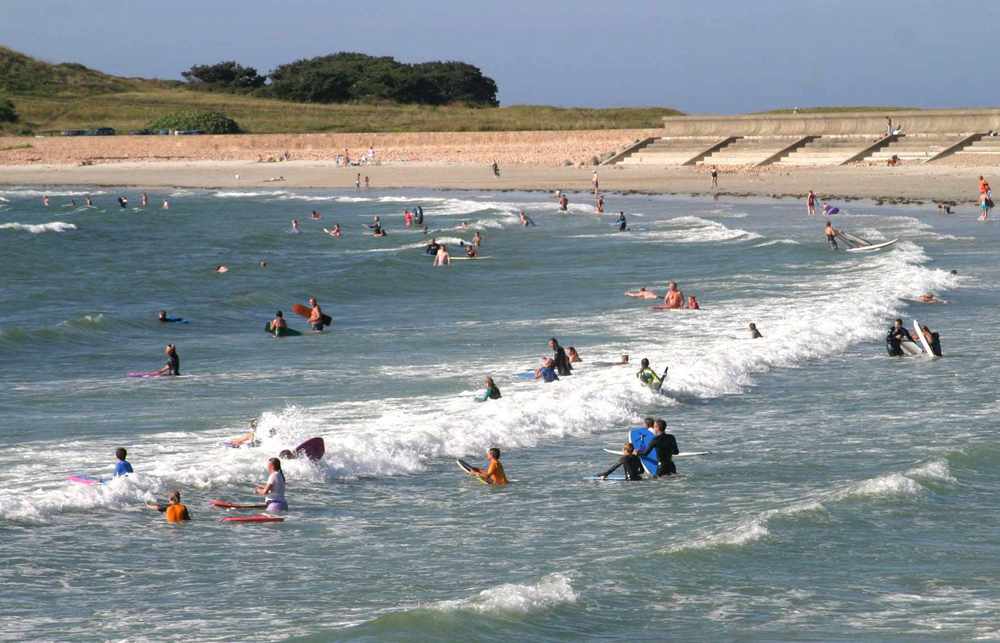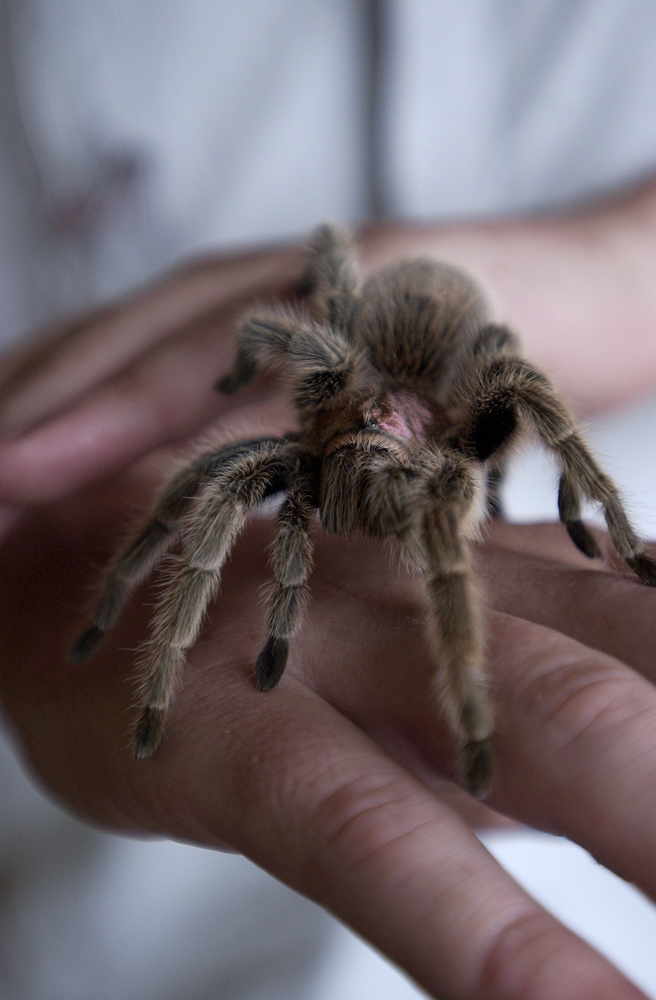Prolonged exposure to cold water can result in a painful condition known as surfer’s ear, a condition which leads to bony swellings developing inside the ear canal, causing blockages of wax and water and resulting in severe hearing problems.
Russell Cathcart, ear, nose and throat consultant at the General Hospital, says: ‘We know that people who swim in cold water without earplugs have a much greater risk of developing these swellings, known as exostoses, over prolonged periods. A study of keen surfers in Cornwall discovered that 73 per cent of them had evidence of surfer’s ear, with those who had surfed for over ten years being most severely affected.’

Once the exostoses have developed, explains Russell, they can be very difficult to treat. ‘They can be removed surgically but they have a high rate of re-forming and, in the end, we often just have to resort to cleaning the ears out on a regular basis under a microscope.’
It is a problem particularly prevalent in Jersey, says Russell. ‘When I worked in the north-east of England, where very few people swim in the sea, I only saw the condition about once a year. However, since moving to Jersey, I’ve been surprised to find a patient with surfer’s ear every couple of weeks.
‘There is good evidence that the use of good-quality earplugs to prevent the ingress of water into the ear canals significantly reduces the chances of developing surfer’s ear over time.’
Peter Trenchard, a local photographer and lifelong surfer, is someone who wishes he had been better advised when he was younger and had done more to protect his ears. Having swum and surfed in seas around the world for many years without ear protection, Peter now has a severe form of surfer’s ear with ear canals that are only a few millimetres wide at their narrowest. As a result, it doesn’t take much for his ears to block up with water, dirt or, even worse, infection, making it difficult for him to hear.
‘My advice to anybody doing watersports would be to consider wearing earplugs,’ says Peter, ‘especially as there are now so many options of earplugs available.’

One reason many surfers are reluctant to wear earplugs, he says, is because they don’t like being unable to hear when they’re in the water. ‘However, there are good-quality plugs out there that allow you to hear while still keeping the water out of your ears. For me, it was a matter of trial and error and a bit of perseverance to find the right plugs. I just wish I’d found them a long time ago. I have discussed surgery with Mr Cathcart but in the end I decided I’d rather just have them cleared out as often as is necessary.’
Russell reiterates the importance of protecting our ears when in the sea. ‘Our ears are constantly shedding dead skin,’ he says. ‘Normally we are not aware of this as the dead skin falls out as flakes or gets mixed in with our ear wax. The problem for patients with exostoses is that this self-cleansing mechanism can’t work effectively and the skin can get trapped behind the bony swellings. If you add trapped water to this mix then it all gets soggy, stagnant and prone to infection, which is why they need to be cleaned out. Usually this can only be done under a microscope by suction as it requires a suction tip only a couple of millimetres wide.’
Or, as Peter puts it: ‘Prevention is definitely better than cure.’

These basic guidelines were drawn up the Jersey Surfboard Club committee because they were concerned at growing problems of respect and safety in the water. They advise that the most important thing for all surfers to do is to use their eyes and ears, and notice what is going on around them. The rules are the same for all surfers, no matter what age they are. ?
- Dont hog the waves. Its not fair to try and catch every wave that comes along you will only antagonise other surfers and earn a reputation as a wave pig or wave hog. Even if you have the paddling power or a faster board that allows you to get to every wave first, remember to give as well as take. ?
- Share the waves and earn respect. Remember you are sharing the ocean not only with surfers, but also the marine life in it. Dont practise competition tactics on those who enjoy surfing just for fun. The sea is there for everyone to share and enjoy. ?
- Dont snake. This is when a surfer deliberately paddles inside a surfer who already has priority. There is a thin line between paddling for position and deliberately snaking someone. For example, if a longboard surfer was up and riding early and another surfer caught the wave inside as it reformed, he would be snaking. ?
- Dont paddle in front of a surfer who is up and riding when you are paddling for the shoulder or unbroken part of the wave. ?
- Dropping in on another surfer is very dangerous. This is when a surfer drops in on a wave when another surfer already has priority. If it is done accidentally, the second surfer should pull out of the wave.[/breakout]

How are you today?
Shattered, even though I went to sleep at 10 pm. Why is it when you have a long sleep you feel so much more tired the next day?
Do you have any medical conditions?
Bad eyesight. I am debating laser eye surgery because I hate both contact lenses and glasses.
Have you ever broken a bone?
Just my heart…
Any other surgery?
I was a bit of a wimp when I was younger and was anaesthetised to remove a wisdom tooth.
What do you do to keep fit?
Lots of walking. I really need to get back into the gym though this year. There is also a dance move I’d like to try out – the slug. YouTube it, it’s great!
What’s your diet like?
Excellent, until the weekend. A fry-up is so much more tempting than a salad when you are suffering from a hangover.
What can you not resist, much as you try?
Staying in on a weekend.
How do you treat a cold?
I don’t really get ill but if I can feel a cold coming on, I take Beechams tablets. According to my mum, it cures every illness known
to man.

Are you a pessimist or an optimist?
Pessimist, which seems to be a common thing among youth today. ‘What am I doing with my life?’
Do you sleep well?
I used to sleep really well until we got two kittens last year. Now I am pestered throughout the night by the demons.
What do you do to escape?
Travel – somewhere with mountains preferably. Unfortunately, you can’t really escape in Jersey any more as you’re bound to bump into someone you know. I also go fishing, although I never catch anything.
Do you have any phobias?
Spiders and swimming over dark patches in the sea. Is there anything more frightening than touching the bottom when you’re swimming?
Do you smoke?
Never have and never will.
What do you do that you know is bad for you?
Breakfast club at work on Fridays. Bread and butter,
too.
What do you think of alternative remedies?
I’ve never tried them but if they have a positive effect on people then I’m all for them.
How long would you like to live?
Love your liver, your body’s ‘vital factory’

ACCOUNTING for more deaths than diabetes and road deaths combined, liver disease is the fifth biggest killer in the UK. And with a 25 per cent rise in alcohol-related liver disease deaths in the last decade, it’s time we starting taking a serious look at the state of our liver health.
‘It is alarming that we have seen a 500 per cent increase in deaths from liver disease since the Seventies,’ says Andrew Langford, chief executive of the British Liver Trust, which ran a Love Your Liver campaign last month.
‘Nowadays, more than 40 people a day die from liver disease. The Chief Medical Officer, Professor Dame Sally Davies, highlights that at least 20 per cent of us are at risk of liver disease.
It is therefore very important that we all look after our liver health. I suggest everyone completes our Love Your Liver health screener and reads the advice and support report that will be produced from it.’
The effects of alcohol:
While Mr Langford points out that there are obviously other causes of liver disease than too much booze, he also explains that ‘the vast majority is caused by three main preventable causes – too much alcohol, obesity and viral hepatitis.’ Therefore, reducing your alcohol intake is perhaps the quickest and easiest thing to address, when it comes to liver health.
The Liver Trust says you don’t even need to give up alcohol completely, just make sure you take two to three consecutive days off the booze a week, so your liver cells recover and repair themselves, and watch those units on the days when you are drinking.

What do livers do?
If your liver cells don’t have time to recuperate, you are compromising the largest organ inside your body. Often called the body’s ‘factory’, the liver carries out 500 different functions, from making proteins and blood-clotting factors, to aiding digestion and energy release, and storing energy and iron. It also – the bit most people know – purifies the blood of bacteria, by-products of digestion and alcohol. While the bacteria and digestion bit can’t really be controlled, if you control the alcohol it has to deal with, you’re instantly helping out. Too much alcohol will lead to alcohol-related liver disease (ARLD). First, there is a build-up of fats in the liver, called alcoholic fatty liver disease. Then comes alcoholic hepatitis (not related to infectious hepatitis) which is the second, more serious, stage of ARLD and occurs when alcohol misuse over a longer period causes the tissues of the liver to become inflamed. At this stage, it is still reversible if you give up drinking, but if you don’t, you reach cirrhosis, the final stage of ARLD, which is when the liver becomes significantly, and irreversibly, scarred.
Silent symptoms:
Liver disease is sometimes referred to as the ‘silent killer’, because early symptoms are often ignored or confused with other conditions – such as feeling generally unwell or tired, having a poor appetite, losing weight, having a tender abdomen, feeling itchy and vomiting.
It’s only when liver damage is quite severe that the effects are more obvious – such as jaundice (yellowing of the eyes and skin), problems with bleeding, drowsiness, fever, swollen abdomen and legs, tarry black stools or vomiting blood (If you have any of these symptoms, consult your doctor immediately).
How to keep your liver in check:
If you’re worried about keeping your own liver healthy, there are things you can do, says the Liver Trust:
- ?Eat more fruit and veg and avoid sugary drinks.
- ?Exercise regularly to burn the fat in your liver and other organs.
- ?Take two to three consecutive days off alcohol a week, to let your liver cells recover and repair themselves.
- ?Practise safe sex.






